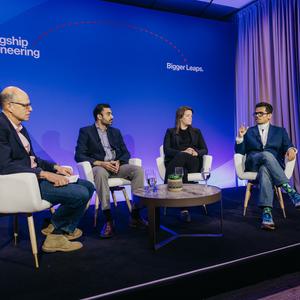- Supranatural proteins, i.e., Synteins™, created through computational design and chemical synthesis, could surpass the therapeutic reach of traditional biologics, unlocking new possibilities for disease treatment.
- Recent breakthroughs in generative protein design and automated chemical synthesis are overcoming the limitations of biotechnology, enabling the creation of proteins with innovative functionalities and properties.
- Flagship-founded Abiologics' unique platform that integrates proprietary generative AI algorithms and peptide synthesis is enabling the creation of new biologic medicines with enhanced efficacy, bioavailability, and specificity.
Biologics — antibodies, peptides, proteins, enzymes, and drug conjugates — are powerful tools in our armamentarium to combat a wide variety of diseases. This trillion-dollar industry produces many different therapeutic protein modalities using the 20 natural amino acids. These protein medicines are discovered, tested, and manufactured using recombinant expression technology that relies on nature’s protein production machinery, which is only compatible with the 20 building blocks, but computational tools and chemical techniques are giving us new capabilities that will unlock the next generation of supranatural biologics and a world of new possibilities for patients.
Supranatural proteins, i.e., Synteins™
The modification or replacement of natural amino acid building blocks within biologics has had a burgeoning impact on the industry over the past two decades. Peptides in particular have benefited greatly from the incorporation of non-canonical amino acids in terms of stability, efficacy, bioavailability, and specificity, leading to a recent surge in the approval of modified peptide-based drugs.
For example, semaglutide (i.e., Ozempic, Wegovy, and Rybelsus) is a variant of the natural, human GLP-1 hormone that is chemically augmented with an artificial amino acid and lipid conjugated to lysine. In combination, these modifications extend the half-life of the molecule, decreasing dose frequency and enabling oral bioavailability. Semaglutide has received broad attention for its impact on diabetes and obesity, as well as potential impacts on an ever-expanding list of applications.
These and other transformative medicines, such as antibody drug conjugates (ADCs) that are revolutionizing oncology, cannot be found in nature and are thus only possible through chemistry. Yet, overall, chemical augmentations have remained relatively minor due to the limitations of recombinant technology relied on for discovery, optimization, and manufacturing.
However, a convergence of technological advancements is enabling a new drug design paradigm. One in which we can imagine proteins that are built with expanded chemical functionality, exceeding what is possible in nature. Flagship founded Abiologics to create this new class of supranatural proteins called Synteins™. These molecules are computationally designed and chemically synthesized from an expanded palette of amino acid building blocks to redefine the limits of what therapeutics can achieve for patients across a range of disease areas.
Generative protein design
Generative protein design has made enormous leaps in just the past several years, giving us powerful new and more-efficient techniques for creating novel proteins. In 2020, DeepMind’s AlphaFold2 proved capable of predicting the structure of proteins from nature with exquisite accuracy, effectively solving what was known as “the protein folding problem.” The ability to predict structure via computation overcomes the challenges and limitations of traditional experimental methods — time-consuming, expensive, and technically challenging crystallization techniques that were historically relied on for the study of protein structures.
While AlphaFold2 can predict the structures of proteins evolution has devised, Flagship-founded Generate Biomedicines has taken this even further. Generate can computationally design new proteins that have never existed before with specific functions, replacing experimental methods that involve scanning massive libraries of potential variants for discovery and optimization. Having learned underlying principles from natural proteins, Generate designs proteins nature has yet to conceive using the naturally occurring amino acids.
At Abiologics, we have created a design suite that utilizes an expanded palette of building blocks to reimagine the underlying chemical structure of biologics. We are adding to the potential therapeutic toolkit entirely new biologics that have supranatural capabilities. For example, we can generate and design Synteins™ that mimic existing proteins but are composed of mirror image monomers (i.e., comprised entirely of D-amino acids) that can precisely bind desired targets.
Chemical synthesis
Computational design, of course, is only the first step. Once a molecule is envisioned on a computer, the next challenge is to create the protein at sufficient quantity and throughput to enable characterization and testing. While most biologics designed and made today are assembled from the 20 natural amino acids, the industry recognizes the advantages of artificial building blocks and has experimented with them to confer desired functions or properties, but has not yet systematically built these molecules entirely from artificial amino acids. This is because traditional recombinant biotechnology relies on a cell’s protein production machinery, which is not capable of polymerizing a diverse array of exotic amino acids.
Advances in generative protein design and optimization paired with automated chemical peptide synthesis are overcoming the limitations of cellular machinery and recombinant technology, allowing us to fully leverage the potential of artificial amino acids and enabling the new approach to programmable biotherapeutics at the foundation of Abiologics.
Solid-phase peptide synthesis, which won the inventor Robert Merrifield a Nobel Prize in 1984, dramatically increases the speed and efficiency of chemical peptide synthesis. But the method has historically suffered from low yields and purities for peptides of more than 30 to 40 amino acids (i.e., 60–80 distinct chemical reaction steps), limiting the ability to recover useful material for downstream testing. Over the past several decades, however, efforts to optimize the efficiency of the coupling reactions, increase purities of final products, and enhance automation have enabled the synthesis of longer and longer peptides.
Today, for example, Brad Pentelute, a professor of chemistry at MIT and Academic Co-Founder of Abiologics, has developed fast-flow synthesis methods that can routinely produce a protein up to 160 amino acids in about the same time the Merrifield lab produced a four-amino-acid-long peptide using solid-phase synthesis in 1963. This progress in peptide synthesis technology has been accelerated at the manufacturing scale partially due to demand in peptide drugs (e.g., semaglutide), which have increased global capacity, reduced raw materials costs, and led to innovations in process chemistry that make SynteinTM synthesis far more feasible today than ever before.
The Abiologics team has developed advanced automated peptide synthesis and purification methods and we have integrated these capabilities into our platform. This allows us to produce hundreds of Synteins™ simultaneously, using any amino acid sequence. Our platform supports a library size large enough to meet the needs of computational design, enabling us to bring any envisioned Syntein to life for the first time.
Breaking free of the central dogma
By combining these advancements in computational design and peptide synthesis, we can unlock supranatural biologics. We can populate the Syntein™ universe and push the boundaries of biologics with diverse and precise chemical functionalization to create medicines with unprecedented properties. Medicines that could offer the possibility of less frequent dosing and oral delivery, access to parts of the human body that were previously impossible to treat, and longer lasting effects than conventional biologics, revolutionizing treatment across a broad range of therapeutic areas, including oncology and immunology.
Digitally designed and chemically synthesized, Synteins™ break free of the central dogma and help to usher in a future where a new class of biologic medicines are engineered. Abiologics benefits and builds on the advances of the broader research community, leveraging these developments to reveal an alternate universe of new possibilities for patients.







